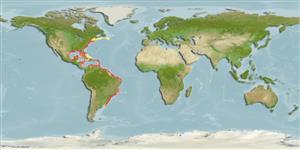>
Carangiformes (Jacks) >
Carangidae (Jacks and pompanos) > Caranginae
Etymology: Trachurus: Greek, trachys, -eia, -ys = rough + Greek, oura = tail (Ref. 45335).
More on author: Nichols.
Environment: milieu / climate zone / depth range / distribution range
Ecologie
marien rifbewoner; diepte 30 - 200 m (Ref. 5951). Subtropical; 45°N - 37°S
Western Atlantic: Canada (Ref. 5951) to Maine, USA and northern Gulf of Mexico to northern Argentina; apparently rare in the West Indies.
Lengte bij maturiteit / Grootte / Gewicht / Leeftijd
Maturity: Lm 12.0 range ? - ? cm
Max length : 40.0 cm TL mannelijk / geslacht onbekend; (Ref. 7251); common length : 30.0 cm TL mannelijk / geslacht onbekend; (Ref. 5217); max. gepubliceerd gewicht: 500.00 g (Ref. 5217)
Dorsale stekels (totaal) : 8; Dorsale zachte stralen (totaal) : 32; Anale stekels: 3; Anale zachte stralen: 28. Body elongate and slightly compressed; posterior edge of upper jaw reaching to below anterior margin of eye; eye large with a well developed adipose eyelid; shallow furrow on upper margin of shoulder girdle; body except for small part behind pectoral fin covered with small cycloid scales; body dark blue dorsally, silver-white ventrally; black blotch on posterior margin of opercle; tip of snout dusky; anterior margin and tip of first dorsal fin dusky, other parts pale; second dorsal fin pale; caudal fin dusky, pectoral and pelvic fins pale (Ref. 13608).
Adults are benthopelagic over continental shelves (Ref. 5217). Rare in oceanic insular areas (Ref. 5217). Juveniles associate with the jellyfish Chrysaora lactea in Southwestern Atlantic. Preyed on by juvenile comb grouper (Mycteroperca acutirostris) when protection given by the jellyfish fails (Ref. 52493). Adults are found often in schools. They feed on small invertebrates. Marketed fresh locally and considered a good food fish (Ref. 9626). In southern Brazil, stocks are found in 147 m deep water (Ref. 47377).
Levenscyclus en paargedrag
Maturities | Voortplanting | Spawnings | Egg(s) | Fecundities | Larven
Robins, C.R. and G.C. Ray, 1986. A field guide to Atlantic coast fishes of North America. Houghton Mifflin Company, Boston, U.S.A. 354 p. (Ref. 7251)
Status op de Rode Lijst van het IUCN (Ref. 130435)
Gevaar voor de mens
Harmless
Gebruik door de mens
Visserij: commercieel
Tools
Speciale rapporten
Download XML
Internetbronnen
Estimates based on models
Preferred temperature (Ref.
123201): 9.5 - 27.1, mean 22.5 °C (based on 191 cells).
Fylogenetische diversiteitsindex (Ref.
82804): PD
50 = 0.5001 [Uniqueness, from 0.5 = low to 2.0 = high].
Bayesian length-weight: a=0.00933 (0.00831 - 0.01048), b=2.96 (2.93 - 2.99), in cm total length, based on LWR estimates for this species (Ref.
93245).
Trofisch niveau (Ref.
69278): 4.0 ±0.2 se; based on diet studies.
Weerstandsvermogen (Ref.
120179): Gemiddeld, minimale populatieverdubbelingstijd 1,4-4,4 jaar (K=0.16; tm=2).
Prior r = 0.55, 95% CL = 0.36 - 0.83, Based on 1 data-limited stock assessment.
Fishing Vulnerability (Ref.
59153): Moderate vulnerability (37 of 100).
Climate Vulnerability (Ref.
125649): Low vulnerability (11 of 100).
Nutrients (Ref.
124155): Calcium = 110 [48, 194] mg/100g; Iron = 1.94 [1.02, 3.58] mg/100g; Protein = 20.1 [19.1, 20.9] %; Omega3 = 0.201 [0.116, 0.339] g/100g; Selenium = 16.6 [8.3, 34.4] μg/100g; VitaminA = 63.7 [15.9, 264.8] μg/100g; Zinc = 1.65 [1.07, 2.55] mg/100g (wet weight); based on
nutrient studies.
